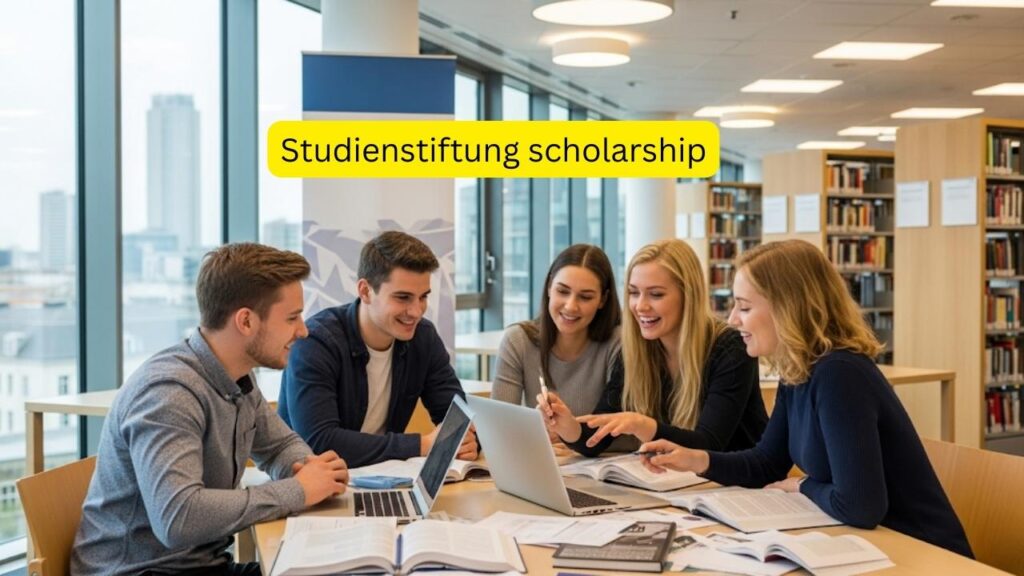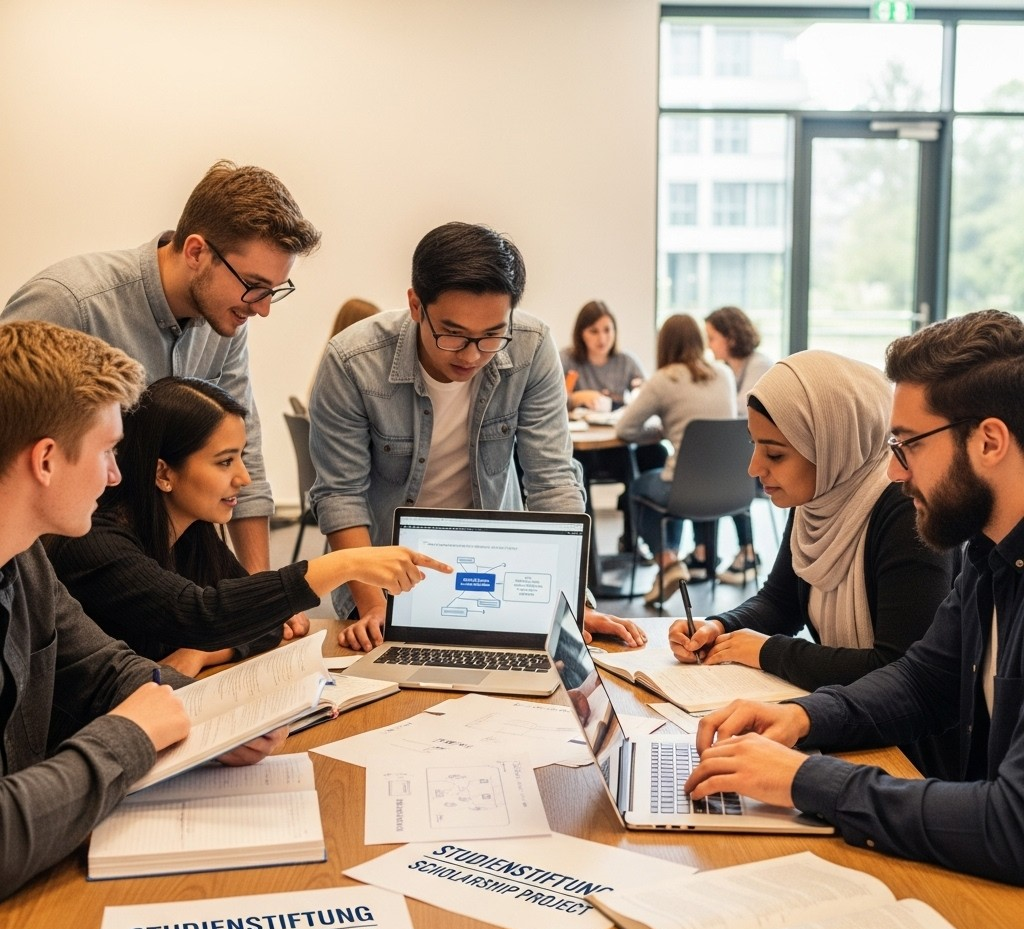Securing a scholarship for your Master’s degree in Germany is a transformative step, and for many, the pinnacle of this journey is the Studienstiftung scholarship. As one of Germany’s most revered and comprehensive funding bodies, the Studienstiftung des deutschen Volkes (German Academic Scholarship Foundation) offers much more than just financial aid. It provides a unique network and a suite of “non-material” support that can define your academic and professional future.1 This guide is designed to demystify the process for Master’s students, providing you with clear, actionable advice to help you stand out.

What Makes a Studienstiftung Scholarship So Special?
Before we dive into the application details, it’s crucial to understand what the Studienstiftung is and why it’s so highly regarded. It’s not just about a monthly stipend; it’s about being recognized for your exceptional talent, personality, and commitment to making a positive contribution to society. Requirements for Students and Proposers.
The scholarship operates on a dual-support system:
- Financial Support: This includes a monthly study allowance of €300 for all scholars, regardless of their financial situation. Additionally, a needs-based living stipend, calculated similarly to the German BAföG student loan system, can be awarded to cover living expenses, potentially reaching up to €812 per month. This non-repayable grant offers a powerful sense of financial security, allowing you to focus on your studies without the constant pressure of working.
- Non-Material (Ideelle) Support: This is the core of the Studienstiftung’s philosophy. It’s a dynamic program of seminars, workshops, summer academies, and a vast alumni network. These opportunities are designed to broaden your horizons, encourage interdisciplinary thinking, and foster personal growth. You’ll engage with top academics and fellow scholars from diverse fields, building connections that can last a lifetime. Official Studienstiftung Website.
The Studienstiftung Scholarship Application Process for Master’s Students
The path to a Studienstiftung scholarship is known to be rigorous, but it’s entirely navigable with the right preparation. Unlike some scholarships, there is no one-size-fits-all deadline. The application process is generally open year-round, but your entry point depends on how you are nominated.
The Three Pathways to a Studienstiftung Scholarship
There are three primary ways for Master’s students to be considered for funding, each with its own set of requirements.
- Self-Application: This is the most common route for Master’s students. You can apply directly if you are in your first or second semester of a Master’s program at a state or state-recognized German university. This path is particularly suited for international students with EU citizenship or those with long-term residence permits in Germany.
- Nomination by University Lecturers or Professors: This is a classic pathway.5 A professor who has taught you, or a liaison professor affiliated with the foundation, can nominate you based on your exceptional academic performance and personal qualities. This endorsement is a powerful signal of your potential and is highly valued by the selection committee.
- Nomination by Examination Office: In some German universities, the central examination office can nominate outstanding students. This is less frequent but a valid path for top-performing candidates.

Essential Eligibility Criteria
To be considered for the scholarship, you must meet several key German university scholarship requirements:
- Academic Excellence: You must demonstrate a top-tier academic record. While there’s no official GPA cutoff, most successful applicants are in the top 5-10% of their cohort. This is where your Bachelor’s degree grades and any grades from your first Master’s semester become crucial.
- Citizenship/Residency: The scholarship is primarily for German citizens, but it is also open to citizens of an EU member state or an EU accession country who are permanently studying in Germany. Additionally, refugees and certain non-EU citizens who have lived in Germany for at least five years may be eligible, as outlined by the Studienstiftung’s statutes.
- Full-Time Study: You must be enrolled in a full-time, consecutive Master’s program. Part-time or second-degree programs are not eligible for funding.
- Social and Political Engagement: This is a cornerstone of the Studienstiftung’s criteria. You must demonstrate a clear history of social commitment and a broad range of interests outside your academic field. This could be volunteering, political activism, involvement in student clubs, or other community-based work.
Preparing Your Application: Beyond the Grades
Once you’ve determined your application pathway, the real work begins. Your application is a holistic presentation of your academic achievements, personal character, and future potential.
The Core Documents to Prepare
- Academic Transcripts and Certificates: You’ll need your Bachelor’s degree certificate and transcript, along with any grades you’ve received from your Master’s program.
- Motivation Letter: This is your chance to tell your story. A strong motivation letter should clearly articulate why you are an ideal candidate. Explain your academic goals, highlight your social commitment, and connect your past experiences to your future aspirations. Don’t just list your accomplishments—show how they’ve shaped your character and worldview.
- Letters of Recommendation: A recommendation from a professor is essential, especially if you are self-applying. The letter should not just confirm your grades but speak to your intellectual curiosity, your engagement in class, and your potential for future success.
In my experience advising students, one common hurdle is writing a compelling motivation letter that goes beyond a list of achievements. The most successful letters weave a narrative that explains the “why” behind their choices and showcases their unique personality.

The Selection Seminar
If your written application is successful, you will be invited to a selection seminar. This is the final and most important stage of the process.
- Format: The seminar typically lasts for two days and involves a series of interviews and group discussions. You’ll meet with a selection committee made up of professors and alumni, as well as other applicants.
- The Interview: Expect to be asked about your academic work, your personal interests, and your social commitment. This is an opportunity to showcase your communication skills and intellectual depth.
- Group Discussion: You will be given a topic to discuss with other applicants. The committee will observe how you interact, listen, and contribute to the conversation. They are looking for critical thinking, respect for differing opinions, and the ability to articulate your thoughts clearly.
The German language is a prerequisite for this process, as interviews and discussions are conducted in German. A B2 or C1 level is typically required.
What Happens After You’re Accepted?
Upon acceptance, you become part of an extraordinary community. The benefits extend far beyond the financial stipend.
- Mentorship: You’ll be paired with a liaison professor who can provide academic and career advice.
- Network: The Studienstiftung’s alumni network is one of the most powerful in Germany, with members in academia, politics, business, and the arts.
- Events and Programs: You’ll have access to a calendar of events, from academic retreats to language courses abroad. The foundation actively encourages its scholars to organize their own events, fostering a culture of initiative and leadership.
The Studienstiftung scholarship is a highly competitive, yet deeply rewarding, opportunity for Master’s students. It requires more than just academic prowess—it demands passion, commitment, and a vision for how you will use your education to make a difference. The process is a journey in itself, pushing you to reflect on your goals and achievements.
MA in Development Management Scholarship 2026 at Ruhr University Bochum
Your Gateway to London: The Canada Elite Scholarship 2025 at London Metropolitan University
FAQ
Q1:Who is eligible for the Studienstiftung scholarship?
The scholarship is primarily for German citizens but is also open to EU citizens studying permanently in Germany and certain non-EU citizens who have lived in Germany for at least five years.
Q2:What is the financial support like for Master’s students?
All scholars receive a monthly allowance of €300. Depending on your financial situation, you can also receive a needs-based stipend, which can reach up to €812 per month. Additional funding for health insurance and children is also available.
Q3:How important is social engagement?
Social and political engagement is a critical criterion for the Studienstiftung.16 The foundation values individuals who are not only academically gifted but also actively contribute to their community.
Q4:Is a B2 German level sufficient for the application?
While B2 is a good starting point, a higher C1 level is generally recommended, as the entire selection process, including interviews and group discussions, is conducted in German.










